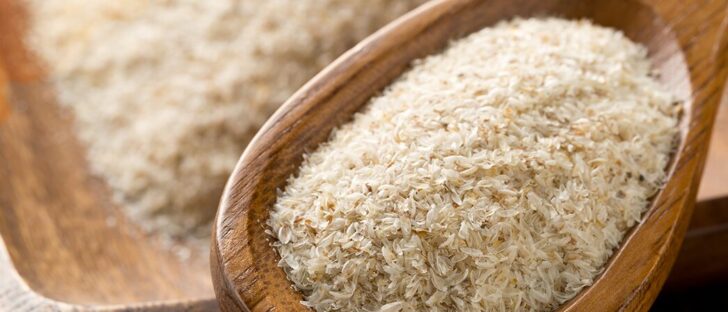Psyllium is a natural remedy that has been used for centuries to promote digestive health. It is derived from the seeds of the Plantago ovata plant, which is native to India and Pakistan. Psyllium is known for its high fiber content and its ability to absorb water, making it an effective solution for a variety of digestive issues.
Contents
Understanding Psyllium: What It Is and How It Works
The origin of psyllium dates back thousands of years. Historically, it was used by ancient civilizations as a natural remedy for constipation and other digestive problems. Today, psyllium is widely recognized for its various health benefits.
The Origin of Psyllium
Psyllium comes from the Plantago ovata plant, also known as blond psyllium or Indian plantain. This plant is native to India and Pakistan, where it has been cultivated for centuries. The seeds of the Plantago ovata plant contain the highest concentration of psyllium fiber, which is a beneficial component used in various forms, such as powder, capsules, and supplements.

Psyllium has a long and rich history in traditional medicine. Ancient Indian texts, such as the Ayurvedic texts, mention the use of psyllium seeds for treating digestive disorders. The plant was highly regarded for its ability to relieve constipation, improve digestion, and promote overall gut health.
Over time, the knowledge of psyllium’s benefits spread to other cultures. In ancient Egypt, psyllium seeds were used as a natural laxative, and they were even found in the tombs of pharaohs, indicating their importance in ancient Egyptian medicine.
As trade routes expanded, psyllium made its way to Europe, where it gained popularity as a natural remedy for digestive ailments. The European herbalists of the Middle Ages recognized the plant’s ability to soothe irritated bowels and alleviate symptoms of indigestion.
The Nutritional Composition of Psyllium
Psyllium is rich in soluble and insoluble fiber, which play different roles in promoting digestive health. Soluble fiber absorbs water and forms a gel-like substance in the digestive tract, helping to soften stool and ease bowel movements. Insoluble fiber adds bulk to the stool and promotes regular bowel movements. Together, these fibers support overall digestive health and help prevent constipation.
In addition to its fiber content, psyllium also contains other beneficial nutrients. It is a good source of minerals such as magnesium, calcium, and potassium, which are essential for maintaining healthy bodily functions. Psyllium also contains small amounts of protein and healthy fats, making it a well-rounded addition to a balanced diet.
Furthermore, psyllium is low in calories and does not contain any cholesterol or saturated fats. This makes it an excellent choice for those looking to manage their weight or maintain a heart-healthy diet.
Research has shown that psyllium can have a positive impact on various aspects of health. Studies suggest that regular consumption of psyllium may help lower cholesterol levels, regulate blood sugar levels, and improve overall gut health. The fiber in psyllium acts as a prebiotic, providing nourishment for the beneficial bacteria in the gut and promoting a healthy microbiome.
It is important to note that while psyllium can be a valuable addition to a healthy diet, it is not a substitute for a varied and balanced eating plan. It is always recommended to consult with a healthcare professional before starting any new dietary regimen or supplement.
The Connection Between Psyllium and Digestive Health
Psyllium is often recommended for individuals who struggle with digestive issues. Its fiber content makes it an excellent natural solution for a range of conditions, including constipation, diarrhea, irritable bowel syndrome (IBS), and diverticular disease.
Let’s take a closer look at the role of psyllium in digestion and how it affects gut health.
Psyllium’s Role in Digestion
When consumed, psyllium expands in the digestive tract, absorbing water and bulking up the stool. This helps regulate bowel movements and promotes overall digestive health. The gel-like substance formed by psyllium in the digestive tract also acts as a gentle laxative, easing constipation.
But how does psyllium achieve this remarkable effect? The answer lies in its unique fiber composition. Psyllium husk is rich in soluble fiber, which has the ability to absorb water and form a gel-like substance. As this gel moves through the intestines, it adds bulk to the stool, making it easier to pass. This process not only relieves constipation but also helps prevent diarrhea by providing a more solid consistency to the stool.
Moreover, psyllium’s bulking action helps regulate bowel movements. It can soften hard stools, making them easier to pass, while also adding bulk to loose stools, providing them with more structure. This dual action makes psyllium an effective solution for individuals with both constipation and diarrhea.
How Psyllium Affects Gut Health
Psyllium’s high fiber content encourages the growth of beneficial bacteria in the gut. These bacteria play a crucial role in maintaining a healthy digestive system. By promoting the growth of these beneficial bacteria, psyllium helps support optimal gut health.
Within the gut, there is a complex ecosystem of microorganisms known as the gut microbiota. This community of bacteria, fungi, and other microbes plays a vital role in digestion, nutrient absorption, and immune function. A healthy gut microbiota is characterized by a diverse range of beneficial bacteria.
Studies have shown that psyllium acts as a prebiotic, providing nourishment for the beneficial bacteria in the gut. As psyllium passes through the digestive tract, it remains largely undigested until it reaches the colon. Here, the beneficial bacteria ferment the psyllium fiber, breaking it down into short-chain fatty acids (SCFAs) and other beneficial compounds. These SCFAs serve as a source of energy for the cells lining the colon and have been associated with various health benefits, including reduced inflammation and improved gut barrier function.
Furthermore, psyllium’s ability to increase stool bulk and promote regular bowel movements helps prevent the overgrowth of harmful bacteria in the gut. By maintaining a healthy balance of bacteria, psyllium contributes to a well-functioning digestive system.
In conclusion, psyllium husk is a valuable natural remedy for digestive issues due to its fiber content and its impact on gut health. Its ability to regulate bowel movements, ease constipation, and promote the growth of beneficial bacteria in the gut makes it an excellent choice for individuals looking to improve their digestive health.
The Health Benefits of Psyllium Beyond Digestion
While psyllium is well-known for its digestive health benefits, it offers additional advantages that extend beyond the digestive system.
Psyllium, derived from the seeds of the Plantago ovata plant, has been used for centuries in traditional medicine for its various health benefits. Apart from aiding digestion, psyllium has been found to have a positive impact on heart health and blood sugar levels.
Psyllium and Heart Health
Research has shown that psyllium can help lower cholesterol levels, specifically LDL cholesterol, which is often referred to as “bad” cholesterol. By binding to bile acids in the intestines, psyllium helps the body eliminate cholesterol, reducing the risk of heart disease.
Furthermore, psyllium has been found to have anti-inflammatory properties that can help reduce inflammation in the arteries. This can contribute to improved cardiovascular health and a lower risk of heart attacks and strokes.
In addition to its cholesterol-lowering effects, psyllium also promotes healthy blood pressure levels. Studies have shown that regular consumption of psyllium can help lower blood pressure, reducing the strain on the heart and decreasing the risk of hypertension.
Moreover, psyllium is rich in antioxidants, which can help protect the heart from oxidative stress and damage caused by free radicals. These antioxidants help maintain the integrity of blood vessels and prevent the formation of plaque, further supporting cardiovascular health.
Psyllium’s Impact on Blood Sugar Levels
Psyllium can also help regulate blood sugar levels. When consumed with meals, psyllium slows down the absorption of carbohydrates, preventing rapid spikes in blood sugar levels. This is particularly beneficial for individuals with diabetes or those at risk of developing the condition.
Studies have shown that psyllium supplementation can improve glycemic control in individuals with type 2 diabetes. By slowing down the digestion and absorption of carbohydrates, psyllium helps stabilize blood sugar levels and reduces the need for insulin or other diabetes medications.
Furthermore, psyllium’s soluble fiber content forms a gel-like substance in the intestines, which can delay the emptying of the stomach. This prolonged digestion process leads to a gradual release of glucose into the bloodstream, preventing sudden spikes in blood sugar levels after meals.
Additionally, psyllium’s ability to improve insulin sensitivity can have long-term benefits for individuals with diabetes. By enhancing the body’s response to insulin, psyllium can help improve glucose uptake by cells and promote better glycemic control.
It is worth noting that psyllium should be consumed as part of a balanced diet and in consultation with a healthcare professional, especially for individuals with existing health conditions or those taking medications.
Overall, while psyllium is widely recognized for its digestive health benefits, its impact on heart health and blood sugar regulation makes it a valuable addition to one’s overall wellness routine. Incorporating psyllium into a healthy lifestyle can contribute to a healthier heart, improved blood sugar control, and enhanced overall well-being.
Incorporating Psyllium into Your Diet
Adding psyllium to your diet is simple and can be done in various ways, depending on personal preference.
Psyllium in Foods and Supplements
Psyllium can be found in the form of powder, capsules, and supplements. These can be easily incorporated into your daily routine. Simply mix psyllium powder into smoothies, yogurt, or oatmeal, or take it in capsule form as directed. It’s important to drink plenty of water when consuming psyllium to ensure proper hydration.
Psyllium Powder – Check on Amazon
Tips for Adding Psyllium to Your Meals
If you prefer to consume psyllium through food sources, there are numerous options available. You can sprinkle psyllium husk powder over cereals or salads, or mix it into baked goods like muffins or bread. Alternatively, you can also try incorporating whole psyllium seeds into your recipes, such as homemade granola or energy bars.
Potential Side Effects and Precautions of Psyllium
While psyllium is generally safe for most individuals, there are a few considerations to keep in mind.
Understanding Possible Allergic Reactions
Some individuals may experience allergic reactions to psyllium. If you have a history of allergies, it’s important to consult with a healthcare professional before incorporating psyllium into your diet.
Interactions with Medications and Other Supplements
Psyllium may interact with certain medications, such as blood thinners and heart medications. It’s essential to discuss any potential interactions with your healthcare provider before starting psyllium supplementation.
In conclusion, psyllium is a natural solution for digestive health that offers various benefits beyond its primary role in promoting regular bowel movements. By incorporating psyllium into your diet, you can support optimal digestive health and potentially improve heart health and blood sugar levels. Remember to consult with a healthcare professional before starting any supplements or making significant changes to your diet. With its rich history and proven effectiveness, psyllium is a valuable tool in maintaining overall well-being.



